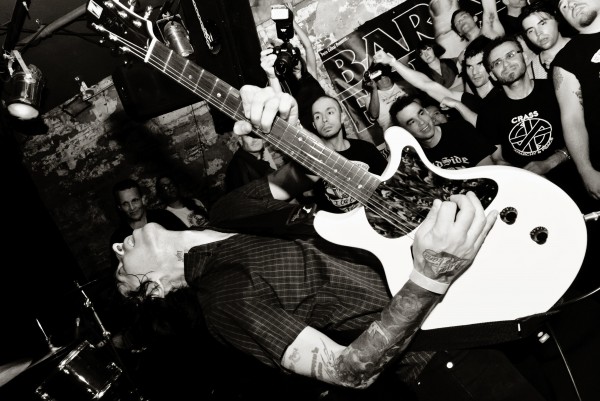
This summer, Features Editor John Gentile got to see three bands with a Black Flag pedigree: Black Flag 2013, FLAG, and Dez Cadena and the Superbas. In light of the recent conflict between the bands, and the comments the punk community has been making about these shows, Gentile wrote his thoughts on these separate shows. Also, in the article are some snappy photos of FLAG by Caroline Moore, some slick photos of Black Flag 2013 by Psqaured Photography, and some super photos of Dez Cadena and the Superbas by Marie Ubaldini.
By now, the story almost sounds like a Roman legend. Many years ago, a band of young men would singlehandedly change the face of punk rock through explosive performances, unique vocal deliveries, lyrics that spoke to fundamental truths, and instrumentation that was just completely whacked-out and light years beyond the next closest thing. Although about 16 people would filter through their ranks, it always seemed to come back to a few main players: Greg, Keith, Chuck, Ron, Dez, Henry, Bill.
And now, some 27 years after Black Flag's inglorious end, where the band whimpered to a stop across the course of a minute long phone call from Greg to Henry, the band has resurrected in not one, but two forms. Two national tours. Two factions.
On one side is Black Flag 2013, which includes Black Flag founder and guitar genius Greg Ginn and second Black Flag vocalist, Ron Reyes. Perhaps somewhat suspiciously, the band also includes Gregory Moore and David Klein, neither of who were in Black Flag during the original run.
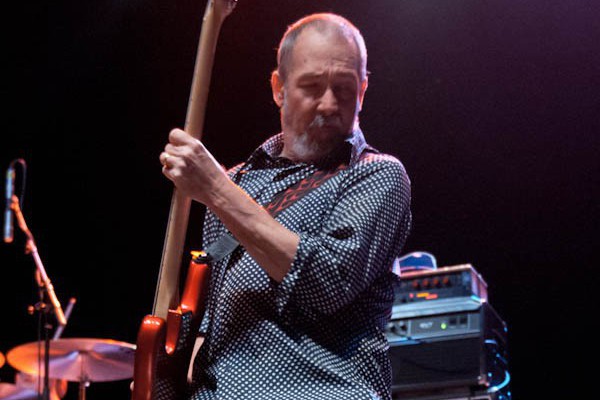 On the other side is FLAG, which includes founding vocalist Keith Morris, bassist and main Black Flag firestarter Chuck Dukowski, third vocalist Dez Cadena, mid-period drummer Bill Stevenson, and Stephen Egerton of Descendents, who also was never in the band's original run.
On the other side is FLAG, which includes founding vocalist Keith Morris, bassist and main Black Flag firestarter Chuck Dukowski, third vocalist Dez Cadena, mid-period drummer Bill Stevenson, and Stephen Egerton of Descendents, who also was never in the band's original run.
To add another twist into the conflict, Dez Cadena hosted a one-off tribute show in support of Barred for Life, which explored the Black Flag bars tattoo, where he played a good number of Black Flag tunes with a mix of punk rock veterans. To be fair, the Dez Cadena show was never advertised as a Black Flag show, but rather, as a tribute to the band and the bars tattoo itself.
As the fates would have it, I had the opportunity to see all three bands in a span of three weeks: FLAG on June 9 at Cleveland's Grog Shop, Black Flag 2013 on June 17 at Philadelphia's Union Transfer, Dez Cadena and the Superbas on June 23 at New York's Bowery Electric.
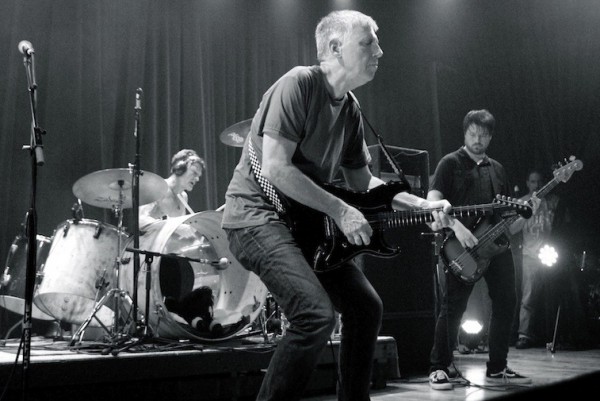 Of course I went. When you get a chance to see the legends playing some of the greatest music of all time in action, you don't sit around and think about your electric bill. You go to the gig, man! On top of that, visiting all three gigs would allow me to see all the bands at the earliest part of the tour. Are they trying to do the same thing? Are they each doing something different? Can they deliver the goods?
Of course I went. When you get a chance to see the legends playing some of the greatest music of all time in action, you don't sit around and think about your electric bill. You go to the gig, man! On top of that, visiting all three gigs would allow me to see all the bands at the earliest part of the tour. Are they trying to do the same thing? Are they each doing something different? Can they deliver the goods?
In some ways, going to see any of these bands is a risk. Lemmy of Motorhead once expressed that he was heartbroken when Little Richard, the premiere rock and roller, ended his gig by handing out Bibles. Likewise, what if, shudder to think, Keith Morris didn't have those firecrackers in his belly? What if Chuck Dukwoski wanted to "update" the bass lines to noodly experimentation? What if Greg Ginn just wanted to solo for 45 minutes? What if Dez Cadena didn't sound like he was spitting tar and glass?
Still, I've always been of the opinion that it's better to hope for the phenomenal and be disappointed than to hide oneself behind memories, so I made my plan to hit up all three gigs.
FLAG at Cleveland's Grog Stop was first and the show itself was only the second gig of the tour. Scanning internet comments, it seems that FLAG is the band most people expect to be "good." This idea is no doubt informed by the AWESOME gigs that Morris has been doing with OFF!, the resurrection of Stevenson's Descendents, and Chuck Dukowski's wonderfully jagged Chuck Dukowski Sextet.
Though, FLAG has had a minority of detractors. The basis of their argument, it seems, is that without Greg Ginn, the founder, head (but not the only) songwriter, and sole constant member of Black Flag, FLAG doesn't have a legitimate claim to play Black Flag's music.
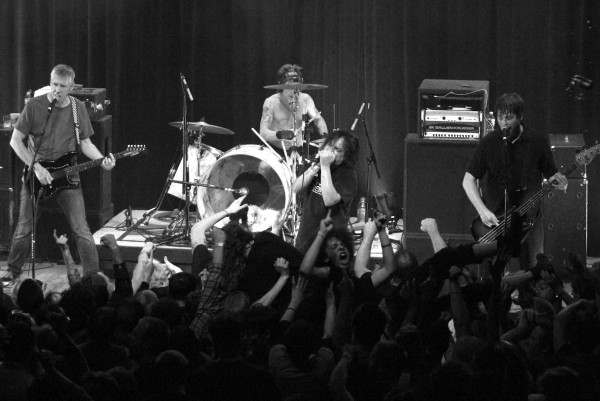 But, of course, FLAG absolutely KILLED it. I mean, really, FLAG ruled. The band blasted through about 24 songs - "Nervous Breakdown," "Wasted," "My War," "Six Pack," "I've had it," "Rise Above"- Hit after hit after hit after hit. Morris was the fieriest he's ever been. Dukowski was a man possessed, contorting his face and whipping his body around the stage. Cadena's tar bark snapped in when he took the vocals near the show's backend. Stevenson slammed on the skins like a man one-third his age and Egerton played with the aggression and style necessary for these wonderful songs.
But, of course, FLAG absolutely KILLED it. I mean, really, FLAG ruled. The band blasted through about 24 songs - "Nervous Breakdown," "Wasted," "My War," "Six Pack," "I've had it," "Rise Above"- Hit after hit after hit after hit. Morris was the fieriest he's ever been. Dukowski was a man possessed, contorting his face and whipping his body around the stage. Cadena's tar bark snapped in when he took the vocals near the show's backend. Stevenson slammed on the skins like a man one-third his age and Egerton played with the aggression and style necessary for these wonderful songs.
To rebut the naysayers, the band didn't seem to be "reliving the old days." Likely because each member is still active in the music scene and has remained active for the last 35 years, the songs felt like timeless pieces of art that should be brought to life, and not relics dragged out from the past. For me, these songs mean as much as they ever have, and it seems from Morris' flared eyes and the spit flying out of Dukowski's mouth, the same holds true for them.
For most people, the set was exactly what they wanted. Little pomp and circumstance - just a group of talented musicians blasting through the early Black Flag catalogue in fierce - live renditions. People on the internet might have boohooed, but everyone at the show seemed to be blasted out of their skull by the berserk delivery. 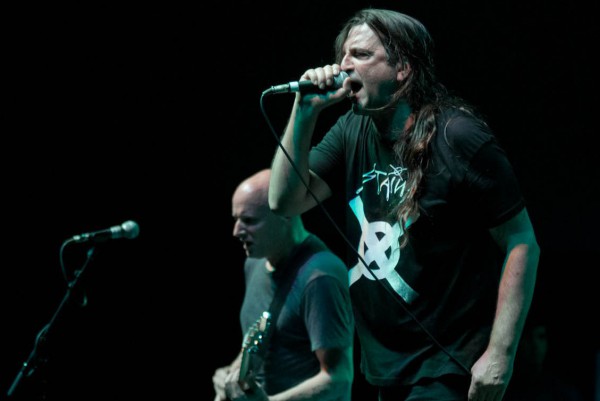
By contrast, the Black Flag 2013 show in Philadelphia was something of an entirely different sort. Morris, Dukowski, Cadena, and Rollins have each stressed that their oeuvre isn't limited to Black Flag, sometimes talking about the band, rarely playing those songs, but every so often playing a Black Flag song here or there at an encore to appease hungry fans. By contrast, Ginn has been even more steadfast, almost not doing any interviews at all, and to my knowledge, never playing any Black Flag songs after the band's unceremonious end. (Of course, Ginn did play Black Flag songs at the debacle that was the Black Flag 2003 reunion, but even there, he focused on jamming and the band's later catalogue.)
That's why it was such a surprise when Ginn announced that not only was Black Flag reuniting with Ron Reyes on vocals, but that they was going on a fairly massive tour and releasing a new album. Somewhat paralleling the criticism launched at FLAG, Black Flag 2013 was also accused of not really being "Black Flag" because it featured only Ginn and Reyes, the vocalist who had the shortest tour of duty in the band, as well as two completely new members (Drummer Gregory Moore did drum during the 2003 reunion).
Live, Black Flag 2013 proved itself to be a very different animal than FLAG, and even a very different animal than any of the original Black Flag lineups. Black Flag 2013 featured the original Black Flag snappiness merged with Ginn's more modern jamming and jazz rhythm techniques. The band played a fairly extended set, which included about 22 songs, including seven new ones. Even more surprising was that of the older songs played, Black Flag 2013 focused on material from Damaged and the First Four Years, in stark contrast to the last Black Flag tour in 1986 which featured a meager three pre-1982 songs. 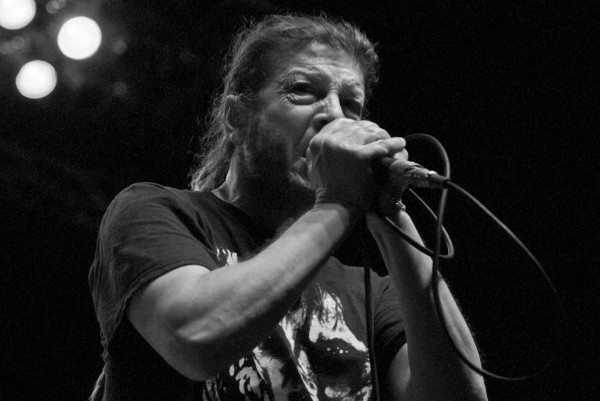
Interestingly, both FLAG and Black Flag 2013 opened with "Revenge" and both closed their set with the famous "Louie Louie" cover, though FLAG did return for an encore and played two more songs.
In some circles, Black Flag 2013 was criticized for being "slow" and somewhat "sloppy." Frankly, I don't agree with either of those assessments. As to the "slow" criticism, I actually don't think it was any slower than the studio recordings, or if it was, only slightly less so and certainly not "half speed" as some sources have stated. As to the sloppiness aspect, I don't think that's a fair criticism. Rather, Black Flag 2013 sounded very loose, so much so, that when the band did snap together, such as the famous downstroke on "Fix Me," it hit that much harder. If the band actually was sloppy, I don't think they would have been able to congeal with such precision at such important points. Rather, like many, if not all of Black Flag songs, I think Ginn is still experimenting with concepts of chaos and order, dynamics and static, in music and is pushing it to the extreme. 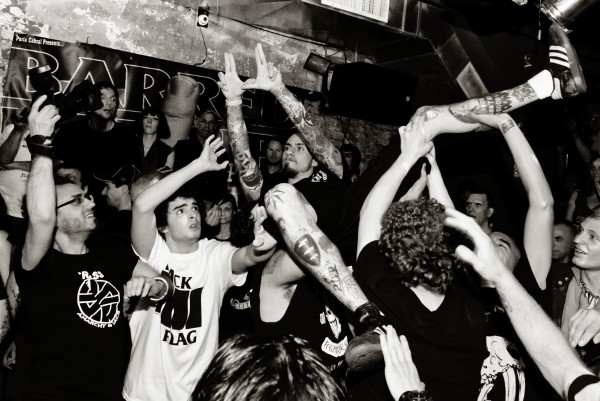
The result was that Black Flag 2013 sounds almost like an organic, savage heavy metal, not unlike Sleep or St. Vitus. Meanwhile, Reyes' voice is as strong as ever, making what used to be yelps and shouts to now howls. I felt that it worked perfectly within the context of the thicker sound.
The Dez Cadena show faced little, if any, criticism, likely because it was advertised as a tribute. Indeed, the show itself had a much easier-going atmosphere, like a bunch of guys showing up to play some fun music.
The show was a blast. Cadena and his band The Superbas played a wide variety of covers by bands that influenced Black Flag, such as The Weirdos, a Hawkwind related group, and the Minutemen. With little pomp, the band just tore through the songs with reverence, but not so much that they portrayed themselves as anything else than just busting out some tunes. Later on, a collection of NYC hardcore musicians groped together to play a full set of Black Flag songs, where Cadena took the mic for a few numbers and then reverted back to the guitar for the rest of the night. As people like Jimmy Gestapo, Paul Bearer, and Todd Youth blasted through Black Flag songs, they handled the songs as very living organisms, able to be shaped to their own personal view, and with little reserve for preserving the songs in their "official" form. It was fairly low key and just a blast.
Although people have stated that "I'll go see FLAG because those guys still sound great" or "I'll go see Black Flag because they have new songs," it didn't really seem like any of the three shows were in competition with each other.
The members of FLAG seemed to want to show that they still are driven by the same fire which got them started 36 years ago. Their songs were sharp, fast, and fierce. Likely because all members of FLAG have been prolific, the FLAG shows seemed to be a way for fans to pay tribute to these legends and for the legends to pay respect to these songs. Simply put, it was amazing.
By contrast, Black Flag 2013 seemed to want to show fans that the Black Flag catalogue is capable of limitless permutations, like jazz standards which have hundreds of recorded versions. While FLAG may have been exhibiting that those musicians are still in their prime, Black Flag 2013 seemed interested in stretching the songs and presenting new versions live, which is sort of the point of a live performance. FLAG wanted to see how much intensity could be packed into the songs themselves while Black Flag 2013 wanted to see how far the songs could be stretched. One show tested the performances while the other tested the source material. Both worked well and were completely different exhibitions.
The Dez Cadena show, which featured about a dozen notable musicians, with Todd Youth conducting the proceedings, wasn't so much a test of the performers or the music as it was a celebration. Singers got on stage and just had fun with the songs, despite the anguished source material. Certainly, there's nothing wrong with. actually enjoying music, is there? 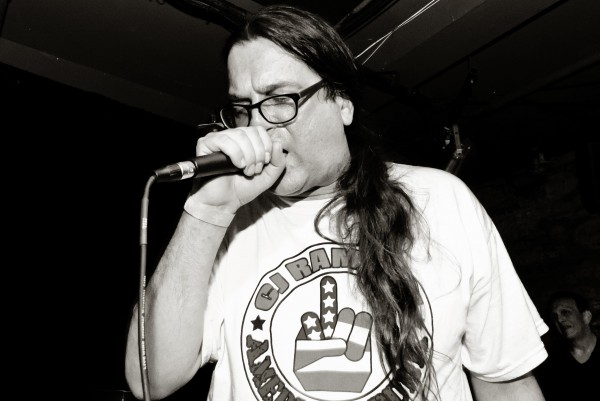
Therefore, being that none of these shows ever play in the same city at the same time, there really is no competition at all. On top of that, it seems that everyone understands that Black Flag 2013 and FLAG are two entirely different things. Does anyone expect that any of these bands are trying to deliver a similar performance? Is anyone confused at the difference between these two bands? I'd wager that not a single person going to any of these shows was confused as to the difference between Black Flag 2013 and FLAG.
For a while, it seemed that the bands even took this position. Reyes was the first to extend the olive branch by stating "I love those guys [in FLAG]. I wish them all the best." Morris reciprocated by stating "My opinion is the more the merrier. I want to say a lot of bad negative things towards one of the members of the other musical organizations, but I don't have to. It's not healthy." However, not-too-long afterwards, Black Flag 2013, in the form of an anonymous press release, dispensed the nasty missive that Black Flag 2013 was "not to be confused with the 'fake' FLAG band currently covering the songs of Black Flag in an embarrassingly weak 'mailing it in' fashion."
The statement is a real head-scratcher for a number of reasons. Mainly, it asks fans to choose between the two bands. But, fans don't need to make a choice. Both bands range between pretty awesome to mind-blowing and seem to aim to do different things. Second, the message really only hurts Black Flag 2013's credibility. The fact of the matter is, pretty much everyone knows that FLAG blasts the house down. So, Black Flag 2013 calling FLAG "weak" is like James Brown calling Bootsy Collins a bad bass player. Riiiiight. If anything, it shows that Black Flag 2013 is seriously threatened by FLAG. So instead of distinguishing itself by saying it had different goals, or ignoring FLAG entirely Black Flag 2013 directly called for a decision from the fans and ended up making itself look petty. On top of that, Black Flag 2013 filed a lawsuit against FLAG, further illustrating that it was threatened by FLAG.
In punk rock, we love to deify the dead. Darby Crash, Joe Strummer, Joey Ramone, and Stiv Bators get waves of praise heaped upon them (as they should.) But, the members of Black Flag, who are every bit equals of those other artists, are still here, still doing what they do, and are still killing it.
A few people have criticized these shows for being based on "nostalgia" or just "for the cash." That's ridiculous and I'm only going to minimally address it. How can the FLAG and Black Flag 2013 shows be based in nostalgia when each member of each band has active modern projects and have for the past 30 years? Have you heard OFF!, The Chuck Dukowski Sextet, or Piggy? On top of that, does anyone going to these shows really think that it's going to transport them back to 1981 or does everyone understand that these are groups of musicians playing phenomenal music in a way that only they can? As for the money, a $25 ticket is pretty damn reasonable.
The point is this: Some of the greatest musicians of all time are playing some of the greatest music in all time and they are doing it perhaps better than ever (Compare FLAG shows to some old Black Flag videosâ¦.) You don't have to pick. You can see 'em all and that's a wonderful gift that so rarely occurs in this world. On top of that, you are able to give thanks to artists that have meant so much to music (and to me, personally) and they are still here to receive it.
When you are very, very old, and on your deathbed, will you be happier to think back and say "I got to see Keith Morris and Chuck Dukowski play "Nervous Breakdown" together and it was one of the greatest performances I've ever seen," or will you be happier that you adhered to some bizarre, amorphous criticisms of "reunions" without ever taking the risk to see if these legends really are the legends history has made them out to be? (HINT: They are.)